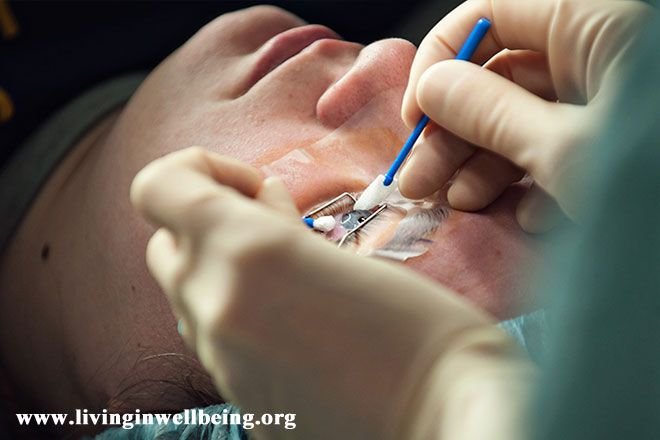
Anyone who's had LASIK eye surgery or researched it knows the procedure is quick and recovery appears to be almost as quick. It takes only a few minutes, then a nap, for most people, and they have clearer sight without glasses for the rest of their lives. While LASIK really is that simple and easy, the recovery process is actually a bit more complicated than a nap. It can easily take months for everything to normalize.
The Early Recovery
Once the surgery is over, it's fairly obvious your eyes are not up to continual use, yet. You'll need to have someone drive you home, and you'll have to wear sunglasses to avoid direct sunlight. In fact, your doctor will more than likely recommend you keep your eyes closed for several hours afterward -- hence the reason why taking a nap right after the surgery is a good idea. It keeps your eyes rested and allows the recovery process to truly begin.
During these first few hours, you'll also have to wear the plastic shields provided by your surgeon's office. While you probably won't feel anything greater than minor discomfort, the shields are necessary due to the delicate state of your eyes immediately following the LASIK procedure.
Once the rest period is over, it's time to remove the shield and apply eye drops to keep your eyes lubricated and accelerate the healing process. That's not the end, however. Your eye doctor or LASIK surgeon will need to see you the next day to check your vision and make sure everything is healing properly. At that point, you'll be legal to drive (without corrective lenses!) and will be able to return to work.
Long-term Recovery
Chances are you'll be seeing your surgeon or eye doctor for the next six months or even longer, on a regular basis. Usually, when the LASIK surgery is done, vision is clear and problem-free from an early point. Six months later, your eyes will feel great, and your vision will remain sharper than ever before. Those few who have difficulty after the surgery, like glare, dry eyes, or other complications will tend to find those don't last very long -- they are often gone far before the six-month mark.
About half of all LASIK patients experience dry eyes, in particular. This usually lasts only a few days and every patient goes home with some artificial tears to help lubricate the eyes after surgery. In some cases, the use will continue beyond those first few days, but it should not compromise your new improved vision at all. Any eye drops you use should be provided by your LASIK specialist -- commercial brands can do more harm than good in these cases.
The important thing to remember over the long term is the fragile nature of your eyes. The eye is already fairly easily injured, but after LASIK surgery, they are even more susceptible. If you play sports, buy a pair of sports glasses to protect your eyes. Those who work with tools should always wear safety lenses of some kind to prevent eye injuries. Below are a few more precautions to take into consideration:
- Avoid dust, smoke, garden work, or yard work, for at least a week after surgery. While you may take a bath or shower as usual, it's still a good idea to keep water or soap out of your eyes for the first week or two. This means no swimming, or hot tubs, or anything that might cause your head to be submerged under water.
- You might want to keep those plastic shields around, too. They prevent you from unconsciously rubbing your eyes, so it's a good idea to wear them when you sleep for several days, up to a week, after surgery; this is especially true if you sleep in the same bed with pets or small children. In those cases, it may be a good idea to wear the shields for as many as ten nights, just to be safe.
- It's likely your eye doctor will tell you not to apply eye makeup at least one day before surgery takes place. Eye makeup should also be avoided for about a week after the surgery is over. Any topical material applied to the eye area creates pressure on your recovering eye and creates a chance of that material getting into the eye itself, greatly increasing the risk of infection or postoperative injury.
Your New Eyes
Looking at the big picture, LASIK recovery is quite rapid. As long as you remember to be careful, it's easy to go about your life just as before (but without contacts or glasses), within a day or two after surgery. Typically, any blurriness or haziness is gone in a matter of hours, with perfectly clear vision by the next day. However, some may take months to completely stabilize. Everyone is different. Just keep in close contact with your eye doctor to make sure your vision remains sharp and crystal-clear for decades to come.
About Author
Laura O’Donnell writes smart content on behalf of the eye doctors at EyeCare 20/20. As an avid writer and learner, she loves to use her skills for engaging others in important topics in creative and effective ways. When she is not working, she loves meeting new people, traveling, and bringing her Pinterest dreams to life. Find her on LinkedIn.












